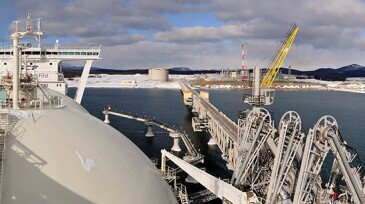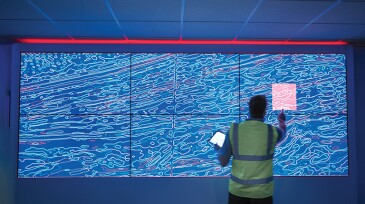Monthly Features
-
Oil and gas experts encourage human/AI partnerships that can “supercharge” capabilities to create competitive advantages.
-
The US supermajor is using one of its lowest-value hydrocarbon products to generate double-digit production increases in its most prolific US asset.
-
This article is the fourth in a Q&A series from the SPE Research and Development Technical Section focusing on emerging energy technologies. In this piece, David Reid, the CTO and CMO for NOV, discusses the evolution and current state of automated drilling systems.
-
Casing deformation has emerged as a major challenge in China’s unconventional oil and gas fields, prompting the development of new solutions to address the issue.
-
Bad vibes are being addressed by contractors as operators push to go faster, deeper, and longer with unconventional wells.
-
As LNG projects sanctioned earlier this decade come onstream, a shortage of new final and pre-final investment decisions threatens to leave the project pipelines dry at a time when global LNG demand is forecast to surge over the next 15 years.
-
Getting more out of gas lift requires understanding how gas injections interact with the oil, water, and gas flowing up the well—in other words, multiphase flow. Some papers are listed to get you started.
-
Medhat (Med) Kamal is the nominee for 2023 SPE President. He and six others make up the new slate of nominees recommended for positions open on the SPE Board of Directors.
-
A look behind-the-scenes reveals what it takes to protect innovative ideas in the fast-moving US shale sector—key lessons learned, pitfalls to avoid, and how to do it the right way, as told by two of the operator's intellectual property (IP) protection leaders.
-
NASA is undertaking a drilling project on the Moon—the first on any planetary body outside the Earth. The mission’s purpose, collecting subsurface soil and ice samples to search for water beneath the lunar surface, is being compared to collecting core samples on Earth and will use technologies, such as a rotary-percussive drill, that have been adapted from those for h…
-
The Gas Exporting Countries Forum (GECF) forecasts in its annual global gas outlook that natural gas will comprise nearly a third of the global energy mix by 2050 and fuel more than half of the world’s electricity production. So, when it comes to fixing climate change, natural gas is one fossil fuel that can’t be dismissed. The 11 countries comprising the GECF control…
-
Ease of use and crowd-pleasing economics are driving US shale producers toward wet-sand completions. Chesapeake Energy is among the latest converts and explains why it wants to use wet sand on every new well.
-
Anomalies in heart function can be diagnosed in real time by measuring an electrical signal. Petroleum engineers have adapted the concept to diagnose anomalous drilling conditions in real time using a shock signature recorded downhole.
-
Will the oil fields of today become the hydrogen fields of tomorrow? Calgary-based Proton Technologies says this is possible and hopes to prove it soon after inking multiple licensing deals with other oil and gas companies.
-
Technology is advancing, and applications are growing, but scaling faces technological and human challenges.
-
Algorithms are taking over the world, or so we are led to believe, given their growing pervasiveness in multiple fields of human endeavor such as consumer marketing, finance, design and manufacturing, health care, politics, and sports. The focus of this article is to examine where things stand in regard to the application of these techniques for managing subsurface en…
Explore Content by Discipline
Power Up With JPT Newsletters
JPT Newsletter (Weekly).
All the top stories, trends, and tech.
JPT Unconventional Insights (Monthly).
Fresh takes on shale and tight oil.
Get JPT articles in your LinkedIn feed and stay current with oil and gas news and technology.
















